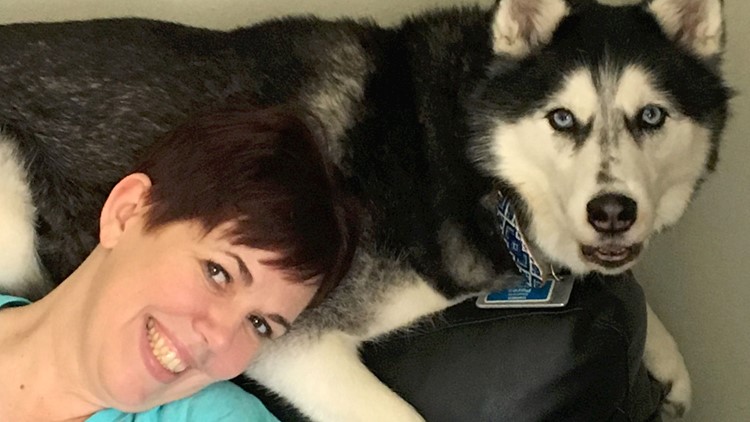Nothing against doctors, but it was a Siberian husky that first found Stephanie Herfel's ovarian cancer and then detected two recurrences of the disease.
You can call it the ultimate in affordable health care. Stephanie feels like she's living a miracle.
"I owe my life to that dog. She's really been a godsend to me. She has never been wrong," the Madison woman said.
The first time was 2013, a year after Herfel moved to Wisconsin from her native California. The husky, Sierra, was 9 months old when Stephanie received her in 2011 from her son in the Air Force who was leaving for overseas duty.
"She put her nose on my lower belly and sniffed so intently that I thought I spilled something on my clothes. She did it a second and then a third time. After the third time, Sierra went and hid. I mean hid," Herfel said.
Herfel had been feeling pain in her abdomen. An emergency room doctor called it an ovarian cyst and sent her home with narcotic pain meds.
But Sierra made her own diagnosis, which she tried to communicate by freaking out and rolling up in a tight ball in the back of a closet.
"To see her become so afraid was spooky in its own right. So I made an appointment with a gynecologist and in a matter of weeks and some blood work with an ultrasound, on 11-11-13 I was sitting in the gynecology oncologist room in shock that I had cancer," Herfel said.
It was stage 3C, a very serious diagnosis. She underwent a full hysterectomy and lost her spleen. Then chemotherapy was administered until April 2014.
Twice more, first in 2015 and then in 2016, Sierra hid again, and Herfel feared the worst. She was right. Cancer had returned both times, first in her liver and then in her pelvic area.
Her primary oncologist, David Kushner, told her Sierra's ability was not a fluke or a lucky guess. There have been other dogs of various breeds with this extraordinary skill, and their accuracy rate is 98% and applies to a number of cancer types.
Ashley Wagner, executive director of the Wisconsin Ovarian Cancer Alliance, said the symptoms of ovarian cancer are often mistaken for other diseases. She said women should think about BEAT, an acronym for bloating, eating difficulty, abdominal pain and tinkle, tinkle, tinkle, meaning frequent urination or bladder changes.
Herfel, who has been active with the alliance for a few years and recently joined its board of directors, was fortunate that Sierra alerted her before the cancer could spread even further.
"It's almost like the dog knows something is going on and is scared. The dog didn't want to be near her," Wagner said.
Sierra reacted the same way when Herfel was visited by a friend with a known case of ovarian cancer. And the dog went into hiding when a new worker showed up one day on a kitchen remodeling job at Herfel's house. She and her husband, Jim, contacted the worker's boss because they felt it was their duty to let someone know.
Sierra becomes anxious when Herfel returns home from regular visits to the UW Carbone Cancer Center. She changes clothes to get rid of the hospital smells. A second dog in the household, little Gizmo, helps keep Sierra calm.
Herfel, 52, is retired from her job as a proposal and grant writer. She spends a lot of time raising funds for research and supporting women across the country with ovarian cancer. She calls them her teal sisters, the color assigned to raise awareness of this illness.
She was tough enough to serve in the Marine Corps in the 1980s, and she's up to the challenge of ovarian cancer, too. She's now disease-free and on a daily regimen of oral chemotherapy as part of a clinical trial, though she wonders and worries if Sierra would be able to smell cancer through the chemo.
Sierra is fine when Herfel is fine. The husky likes her tennis balls and hedgehog toy, car rides, long walks and playing outside in winter. But she is very protective of Herfel, always lying between her and the outside door.
Ovarian cancer has a habit of coming back again and again. Herfel, who is already defying the odds as a five-year survivor, remains upbeat.
"There are things that are coming out new every day. That's how I live my life. I'm going to do the best thing I can do at the time until the next best thing comes along," she said.
She now believes she will outlive Sierra. She loves the dog and dreads the day they are not together. Her plan is to write a book about this amazing companion.
"I just feel like my story can let people think about their animals and think, 'Wow, my animal did this when I got diagnosed.' Just to give the animals credit that they are pretty smart."



